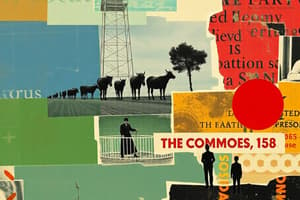Podcast
Questions and Answers
The 'Tragedy of the Commons' describes a situation where individuals acting in their own self-interest can overuse and deplete a ______ resource, leading to negative outcomes for everyone.
The 'Tragedy of the Commons' describes a situation where individuals acting in their own self-interest can overuse and deplete a ______ resource, leading to negative outcomes for everyone.
shared
In a common resource setting, adding another cow to a shared pasture benefits the herdsman with a gain of +1, but it creates ______ for everyone else as the pasture becomes overgrazed.
In a common resource setting, adding another cow to a shared pasture benefits the herdsman with a gain of +1, but it creates ______ for everyone else as the pasture becomes overgrazed.
overuse / negative effects
______ goods are easy to charge for, and one person's use does not limit another person's access, such as a subscription to Netflix.
______ goods are easy to charge for, and one person's use does not limit another person's access, such as a subscription to Netflix.
Toll
A ______ good is characterized by non-excludability and rivalrous consumption, meaning it's hard to prevent others from using it, and usage by one person diminishes its availability for others.
A ______ good is characterized by non-excludability and rivalrous consumption, meaning it's hard to prevent others from using it, and usage by one person diminishes its availability for others.
According to Elinor Ostrom, communities can manage common resources by establishing local rules that match their specific needs and conditions. This approach is known as ______-based management.
According to Elinor Ostrom, communities can manage common resources by establishing local rules that match their specific needs and conditions. This approach is known as ______-based management.
______ is a solution that assigns ownership of resources to individuals or companies, so they bear the full costs and benefits of their actions, such as carbon trading.
______ is a solution that assigns ownership of resources to individuals or companies, so they bear the full costs and benefits of their actions, such as carbon trading.
One of the key challenges in using ______ coercion to manage the commons is the difficulty in enforcing regulations on a global scale due to the lack of a global government.
One of the key challenges in using ______ coercion to manage the commons is the difficulty in enforcing regulations on a global scale due to the lack of a global government.
The problem with managing pollution is not about taking resources from the commons, but about ______ waste into it, such as pollutants, chemicals, or radioactive materials.
The problem with managing pollution is not about taking resources from the commons, but about ______ waste into it, such as pollutants, chemicals, or radioactive materials.
One of Elinor Ostrom's principles for governing the commons is to ensure that those affected by the rules have the ability to participate in ______ the rules.
One of Elinor Ostrom's principles for governing the commons is to ensure that those affected by the rules have the ability to participate in ______ the rules.
In community-based resource management, local rules need to ensure proportional equivalence between the ______ and benefits for each user.
In community-based resource management, local rules need to ensure proportional equivalence between the ______ and benefits for each user.
______ is a pricing mechanism designed to internalize the externalities caused by emissions, where the costs of using the resource are taxed to the individual responsible for the emissions.
______ is a pricing mechanism designed to internalize the externalities caused by emissions, where the costs of using the resource are taxed to the individual responsible for the emissions.
______ institutions are difficult to scale globally because they are highly context-dependent, and what works for one community may not work for another.
______ institutions are difficult to scale globally because they are highly context-dependent, and what works for one community may not work for another.
Flashcards are hidden until you start studying
Study Notes
Tragedy of the Commons
- Describes a situation where individual self-interest leads to the overuse of shared resources.
- Results in negative outcomes impacting the entire community.
Common Resource Setting
- Adding an additional cow to a shared pasture benefits the individual herdsman.
- However, it creates overuse, leading to negative effects for all users due to overgrazing.
Toll Goods
- Defined as goods that are easy to charge for, allowing simultaneous use by multiple individuals.
- Example includes subscription services like Netflix, where one person's use does not limit others.
Common Goods
- Characterized by non-excludability and rivalrous consumption.
- Difficult to prevent usage by others, and one person’s consumption reduces availability for others.
Community-Based Management
- Elinor Ostrom's approach where communities establish rules tailored to their specific needs and conditions.
- Promotes sustainable management of common resources through local governance.
Privatization
- Assigns ownership of resources to individuals or companies.
- Ensures they bear the full costs and benefits of their actions, with examples like carbon trading.
Mutual Coercion
- A challenge in managing commons through mutual coercion is the enforcement of regulations on a global scale.
- Difficulty arises due to the absence of a global governing body.
Pollution Management
- The core issue in managing pollution involves adding waste, such as pollutants and chemicals, to the commons.
- This contrasts with merely taking resources from the commons.
Modification of Rules
- One of Ostrom's principles emphasizes the importance of involving affected parties in the modification of rules.
- Ensures that users have a say in how resources are governed.
Proportional Equivalence
- Community-based management requires that local rules provide a balance between costs and benefits for each resource user.
- Ensures equitable access and sustainability of resources.
Carbon Taxation
- A pricing strategy aimed at internalizing emissions-related externalities.
- Costs of using a resource are taxed to individuals responsible for the emissions produced.
Bottom-Up Institutions
- These institutions face challenges in scaling globally due to their dependence on local context.
- Strategies effective in one community may not be applicable or successful in another.
Studying That Suits You
Use AI to generate personalized quizzes and flashcards to suit your learning preferences.




